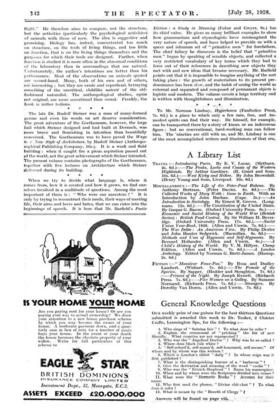When we try to decide what language is, where it
Comes from, how it is created and how it grows, we find our- selves involved in a multitude of questions. Among the most important of them is : " Who were our ancestors ? " It is Only by trying to reconstruct their needs, their ways of meeting life, their aims and loves and hates, that we can enter into the beginnings of speech. It is here that Mr. Barfield's Poetic Diction : a Study in Meaning (Faber and .Gwyer, 9s.) has its chief value. He gives us many brilliant examples to show how grammarians and etymologists have misimagined the very nature of speech, and have helped to provide us with a queer and inhuman set of " primitive men " for forefathers. The chief fallacy he discovers is the belief that " primitive men " began by speaking of sensible objects, and collected a very restricted vocabulary of key terms which they had to force out of their references in describing new objects they
Met with and new ideas that became necessary. Mr. Barfield points out that it is impossible to imagine anything of the sort
taking place : the growth of materialism to its present pre- dominance has been slow, and the habit of seeing the world as external and separated and composed of pernianent objects is logistic and modern. The volume covers a large territory and is written with thoughtfulness and illumination.
, *




































 Previous page
Previous page